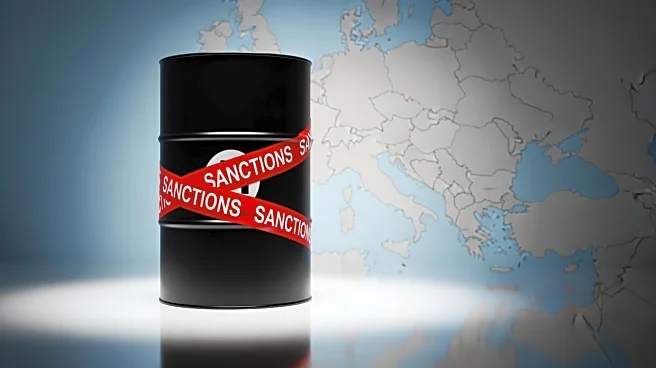What's Happening?
The United States has imposed sanctions on Russia's two largest oil companies, Rosneft and Lukoil, in a strategic move to pressure Russia into negotiating a peace deal over the ongoing conflict in Ukraine.
These sanctions target financial institutions that facilitate transactions for these companies, potentially cutting them off from U.S. markets and payment systems. Ukrainian President Volodymyr Zelensky has welcomed these sanctions as crucial, emphasizing the need for increased pressure on Moscow to bring it to the negotiating table. The sanctions coincide with an EU summit in Brussels, where leaders are discussing additional measures against Russia, including a ban on Russian liquefied natural gas imports.
Why It's Important?
The sanctions represent a significant shift in the U.S. approach towards Russia, aiming to weaken its economic capabilities and force a reconsideration of its stance on the Ukraine conflict. By targeting major oil companies, the U.S. seeks to disrupt Russia's revenue streams, which are vital for funding its military operations. This move could potentially alter global oil markets, as countries like India and China, major importers of Russian oil, may seek alternative sources. The sanctions also signal a unified international effort to pressure Russia, with the EU adopting its 19th sanctions package against Moscow. The broader impact could lead to increased diplomatic isolation for Russia and a reevaluation of its foreign policy strategies.
What's Next?
The effectiveness of these sanctions will depend on their enforcement and the willingness of international buyers to comply. If the U.S. rigorously enforces these measures, Russia may be forced to sell its oil at a discount, affecting its economic stability. The EU's continued sanctions and diplomatic efforts may further isolate Russia, potentially leading to increased internal pressure on President Putin to negotiate. However, skepticism remains about Russia's willingness to engage in peace talks, as previous sanctions have not led to significant changes in its approach. The international community will be closely monitoring Russia's response and any shifts in its geopolitical strategies.










